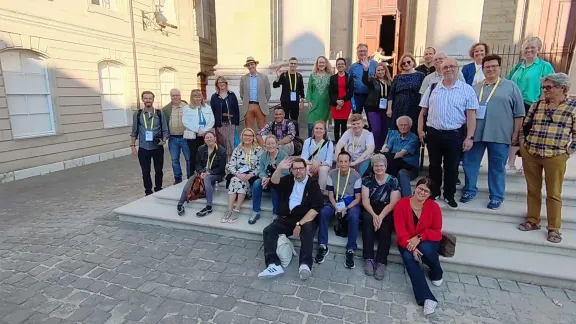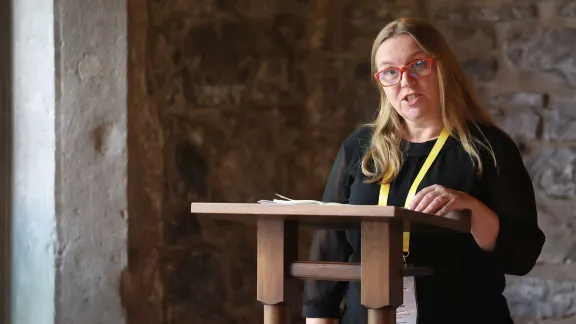
What is truth? ECIC participants in front of the Cathedral St Pierre in Geneva. Photo: WCC/ Ivars Kupcis
European communicators discuss AI’s ethical implications and practical uses
(LWI) – The European Christian Internet Conference (ECIC) brought together Christian communicators to explore the ethical and practical challenges of using Artificial Intelligence (AI) in church communication. Through keynote speeches, debates, and personal exchanges, participants reflected on the impact of AI and emphasized the ongoing need for human connection in an increasingly tech-driven world.
Between Fear and Excitement
Around 30 communicators from churches and faith-based organizations from across Europe gathered at the Ecumenical Institute in Bossey, near Geneva, Switzerland, from 9-11 September 2024, to explore possible uses and challenges of AI in church communication.
In a world increasingly shaped by algorithms and information technology, communicators from across Europe gathered in Switzerland to discuss a critical question: how can artificial intelligence serve the mission of the church while preserving truth and human connection?

The annual gathering of the European Christian Internet Conference takes place on 9-11 September 2024 in Bossey and Geneva, Switzerland, focusing on the topic “What is truth? - Ethical and practical issues in the use of Artificial Intelligence.”Photo: WCC/ Ivars Kupcis
"The question of truth in AI is crucial for churches, as people are concerned about its implications. Many still struggle with digitalization, and as communicators, we face a surge of fake news," said Agnieszka Godfrejów-Tarnogórska, ECIC president and communications officer for the Evangelical Church of the Augsburg Confession in Poland, a member of the Lutheran World Federation (LWF).
Keynote speakers explored the nature of AI, key ethical questions, and shared practical examples of AI's use in both church communication and humanitarian work. While text generation, image and sound editing as well as chatbots in customer relations become increasingly common, a survey presented by Prof Holger Sievert, study dean at Macromedia University in Cologne, Germany, showed also that the use of AI is not discussed at all in many churches – while members of these churches may already use this technology in their private lives. Hovig Etyemedian, UNHCR Head of Innovation Service, shared examples of AI use in UNHCR’s humanitarian work, while communicator and AI specialist Dr Erin Green discussed the use of custom GPT models and their ethical implications.
Personal Exchange is Key
“Many participants already knew something about AI or were actively using it in their work. That made networking especially valuable. We were able to exchange opinions and experiences—not only about AI but also on other communication-related topics,” Godfrejów-Tarnogórska added.
As Christian communicators working with digital technologies, we are called to witness to the truth in a world increasingly shaped by algorithms and data.
ECIC President Agnieszka Godfrejów-Tarnogórska

ECIC President Agnieszka Godfrejów-Tarnogórska offers a reflection on John 18.38. Photo: WCC/ Ivars Kupcis
In short sessions called "Tell Your Story," participants presented their own communication projects, including a podcast on ethics, funny TikTok videos, to a digital avatar of reformer Martin Luther designed to answer questions about his teachings.
In the opening prayer, Godfrejów-Tarnogórska reflected on the question 'What is truth?' which Pontius Pilate asked Jesus: “As Christian communicators working with digital technologies, we are called to witness to the truth in a world increasingly shaped by algorithms and data.”
Throughout the conference, she also emphasized the importance of prayer, reflection, and spiritual life. "We can't reflect or feel others' emotions through AI. We need to meet, talk, and express our feelings, especially about God and community. AI can't replace that—we still need human connection for true communication."


